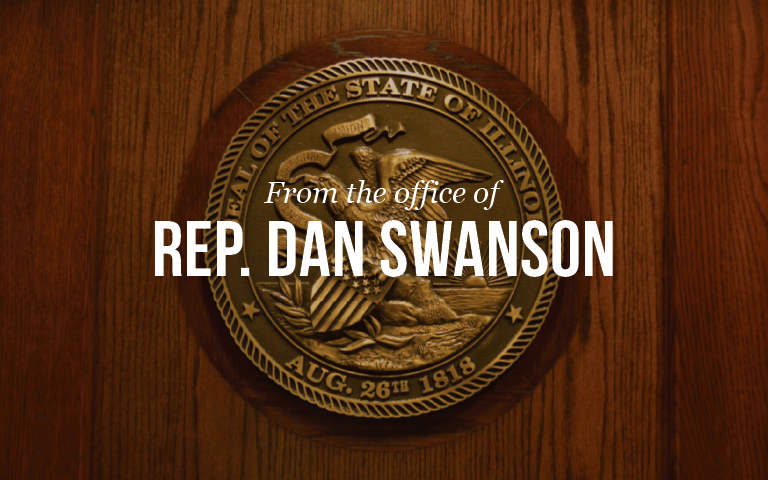Inside:
- Pritzker Executive Order lays groundwork for more tax increases
- House Republican plan would cut taxes on tips and overtime
- Veto session coming up later this month
- Welcome Home!
Pritzker Executive Order lays groundwork for more tax increases
Last week Governor Pritzker issued an executive order which admits that Illinois’ economy is going downhill and tried to blame the federal government for Illinois’ long-standing budget problems.
The current year’s budget included $1 billion in tax increases and budgetary gimmicks just so that it could appear balanced on paper – just barely. The budget was passed against the backdrop of a long series of warnings from economists and credit rating agencies that a recession is likely on the horizon.
The governor’s executive order instructs state agencies to find a way to cut 4% of spending, essentially admitting that the budget he signed in June did not correctly forecast how much revenue would be available to cover all the spending. That budget was the most expensive spending bill ever enacted in Illinois.
This admission by the governor comes after years of facts and data which have been generated since he took office in 2019, showing that Illinois’ economy has continuously underperformed both the nation as a whole and our neighboring states. Illinois’ unemployment rate has been higher than the national rate, and the rate of our neighbors (for example, while Illinois stands at 4.4% unemployment, Indiana is at 3.6%). Illinois consistently ranks near the bottom in overall tax competitiveness. We have the highest property taxes in the country, and the second-highest motor fuel tax.
All the while, Governor Pritzker has continued to increase spending and increase taxes to pay for it. Since taking office in 2019, he has signed budgets which increased state spending by nearly 40%: from $40 billion up to this year’s record of $55 billion.
House Republicans warned that this budget was irresponsible and spends too much. We need a transparent budget process that protects taxpayers, focuses on core services and avoids pork projects. The governor seeking to blame Washington for problems he caused is nothing more than a smokescreen for more tax increases.
House Republican plan would cut taxes on tips and overtime
House Republicans have been fighting for tax relief for working people in Illinois for years. One of this year’s proposals is an elimination of state income taxes on tips and overtime pay, which thousands of Illinois workers rely upon to make ends meet.
The proposal is included in the Relief for Working Families bill package introduced earlier this year. With the fall session just around the corner, it is a good time to consider moving these bills forward.
House Bill 1750 would exempt tip income and overtime compensation from state taxes. It would allow workers to deduct these earnings from their taxable income, which would increase take-home pay for thousands of Illinoisans. House Bills 1898 and 2735 make similar changes.
Tips make up a significant portion of a worker’s income in fields such as hospitality, food service and personal care. The Illinois Restaurant Association reports that Illinois is home to more than 77,000 restaurant servers alone. Many of these workers rely on gratuities for extra income to pay bills. Taxing tips can feel like a penalty for providing good service. Overtime pay is often earned by those who take on extra shifts to support their families or meet an urgent expense.
With inflation continuing to squeeze household budgets, removing state taxes on these earnings would be a meaningful, immediate relief to those who need it the most.
Veto session coming up later this month
In a couple of weeks, the Illinois General Assembly will return to Springfield to convene for the annual two-week Veto Session. The session is scheduled for October 14-16 and October 28-30. The Veto Session is generally intended for the legislature to review legislation passed in the spring that has received a total veto or an amendatory veto from the Governor. The legislature can seek to override a Governor’s veto by a 3/5 majority vote in each chamber or vote to accept an amendatory veto.
However, the Veto Session is also often used to take up major policy issues that were not resolved in the spring or have arisen over the summer months. This year, among others, two major issues that the legislature may consider are a bailout of the Chicagoland mass transit agencies, which are facing a massive fiscal cliff and an operating budget shortfall of over $770 million, and a new green energy package.

Welcome Home!
Last week I attended the return of the QC Honor Flight at the Quad City airport. I recognized several veterans as they passed by to see families awaiting their arrival.
A Vietnam veteran overwhelmed by the huge crowd told me, “There was no one here 58 years ago when I came home!”
Welcome home!
More news
Tick-borne Powassan virus infects Illinois resident for 1st time ever
Celebrating Constitution Day at Western Illinois University
IDNR announces Chronic Wasting Disease sampling locations for deer hunters
Illinois lawmakers discuss plan to require registered voters participate in general elections
